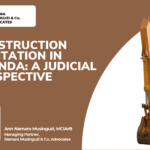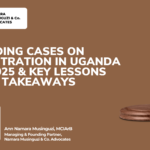Plinth Consultancy Services Ltd v. Inyatsi Construction Ltd, Inyatsi Group Holdings (Pty) Ltd & Absa Bank (U) Ltd, Misc. Cause No. 0053/2024. Ruling delivered on August 30, 2024 by Hon. Lady Judge Harriet Grace Magala.
Attention!
Arbitration without privity is an exception of the doctrine of privity of contract.
Background to the case
This was an application for an interim measure of protection that was brought under Article 28(2) of the Rules of the International Chamber of Commerce, section 6(1) of the Arbitration and Conciliation Act Cap 5, rule 13 of the Arbitration Rules and section 98 of the Civil Procedure Act.
The application was brought pursuant to an arbitration lodged by the Applicant before the International Chamber of Commerce for Arbitration (ICC). The dispute leading to the filing of the arbitration claim and the subsequent application for an interim measure of protection arose from a sub-contract agreement executed between the Applicant and Inyatsi Construction (U) Ltd. The main contract agreement was between the Government of Uganda, through the Ministry of Water and Environment, and the First Respondent for the construction of Kabuyanda Earth Dam in Isingiro District.
The interim measures of protection sought were a lien be issued over the bank guarantee by and between the Respondents in respect of the construction works for the Earth Dam with an order sought restraining the Respondents from discharging the said guarantee before determination of the arbitration; an alternative order compelling the First and Second Respondents to provide security for the award and costs pending the determination of the Arbitration claim, an alternative order to attach a lien/freeze the outstanding contractual sum owing to the First Respondent from the Ministry of Water and Environment in respect of the construction works for the Kabuyanda Earth Dam and finally; an order seeking a lien over the accounts/money belonging to the First Respondent held in the Third Respondent as security for the award and costs pending the determination of the arbitration claim.
The crux of the Respondent’s case was that the Applicant had failed to satisfy the major ground for the grant of an interim protective measure which was; the existence of an arbitration agreement between the Applicant and the First Respondent. This argument was premised on the sub-contract agreement which was between the Applicant and Inyatsi Construction (U) Ltd and of which none of the Respondents was a party.
Ruling of the Court
The Court in granting the interim measure of protection, advanced the following reasons:
- The Court in concluding that there was an Arbitration Agreement between the Applicant and the Respondents relied on the common law doctrine of arbitration without privity, stating the instances where the same is said to arise and these instances include consent/willingness of the parties to arbitrate and agency relationships respectively.
- In respect to the consent/willingness of the parties to arbitrate, the Court relied on the commencement of the arbitral proceedings by the First Respondent and the acceptance of the same by the Applicant. The Court ruled that these actions of the two parties constituted an Arbitration Agreement.
- Because the parties consented to an Arbitration Agreement, the bedrock principle of the doctrine of separability applied and hence, the Court extrapolated the arbitration agreement as agreed to by the Applicant and the First Respondent from the sub-contract agreement executed between the Applicant and Inyatsi Construction(U) Ltd and concluded that arbitration without privity applied in the instant case.
- In respect to an agency relationship as one of the instances where arbitration without privity applies, the Court relied on the fact that the First and Second Respondents were shareholders and therefore beneficial owners of Inyatsi Construction (U) Ltd. The Court further relied on the different communications in relation to the construction project which were always between the Applicant and officials from the First Respondent. It therefore followed that Inyatsi Construction (U) Ltd was the agent of the First Respondent and hence the doctrine of arbitration without privity applied.
Effect of the Court’s ruling
The Court expounded on the doctrine of arbitration without privity, emphasizing that it only applies in arbitration. The Doctrine of arbitration without privity is inverse to the doctrine of Privity of contract which limits applications of contractual terms to only parties to a contract. The doctrine of privity of contract is premised on the principle of freedom of contract that entitles persons to freely enter into a contractual relationship with terms mutually agreed upon.[1] Because of these mutually agreed upon terms, a person or entity that is not party to a contract cannot ordinarily rely on or invoke the terms of the contract. However, in certain instances, a party that is not privy to a contract can invoke arbitration without privity and the Court broke down some of those instances which include mutual consent and existence of an agency relationship. In addition, The Court reiterated the core principle of separability of an arbitration agreement, relying on commencement of arbitral proceedings by the First Respondent and acceptance of the same by the Applicant in essence creating an arbitration agreement between the parties which was considered separate and distinct from the Sub Contract Agreement of which the First
Respondent was not a party. The principle of arbitration without privity is a welcome relief to aggrieved persons who, as long as they fulfil the criterion extensively discussed in the case; are able to claim relief from persons who they otherwise are not in privity of contract with.
Further, the Court fundamentally relied on the relationship between the First and Second Respondents and Inyatsi Construction (U) Ltd, with the former being shareholders in the latter hence making them beneficial owners of Inyatsi Construction(U) Ltd. As beneficial owners, the Court imputed an agency relationship between the First & Second Respondents and Inyatsi Construction (U) Ltd. This is a welcome addition to the jurisprudence in Uganda where the laws relating to companies, partnerships, trusts and cooperative societies were amended between the period 2022-2023 to provide for the filing of particulars of all beneficial owners in entities, with more recent amendments relating to regular annual compliance.[2] With this ruling, it is evident that despite the principle of corporate personality wherein a company is separate and distinct from its shareholders, in the resolution of certain matters before it, to ensure that the ends of justice are met, the Courts shall consider the principle of beneficial ownership as an exception to that general principle.
Concluding observations
This Ruling emphasizes the unique nature of arbitration as a mode of Alternative Dispute Resolution through the exposition of principles such as arbitration without privity and emphasizing the doctrine of separability of an arbitration agreement.
Further, the Court has buttressed its willingness to uphold the choice of arbitration by parties as a method of dispute resolution with Court interference only as provided for in the Arbitration Act Cap 5.

Ann Namara Musinguzi; MCIArb
Managing Partner, Namara Musinguzi & Co. Advocates
info@namaralaw.com
September 4, 2024
[1] Companies (Beneficial Owners) (Amendment) Regulations 2024; Partnership (Beneficial Owners) (Amendment) Regulations 2024; Trustees Incorporation (Beneficial Owners) (Amendment) Regulations 2024; and Cooperative Societies (Beneficial Owners) (Amendment) Regulations 2024.
[2] This principle was enumerated by Sir George Jessel in case of Printing and Numerical Registering Co v Sampson (1875) 19 Eq 462.



